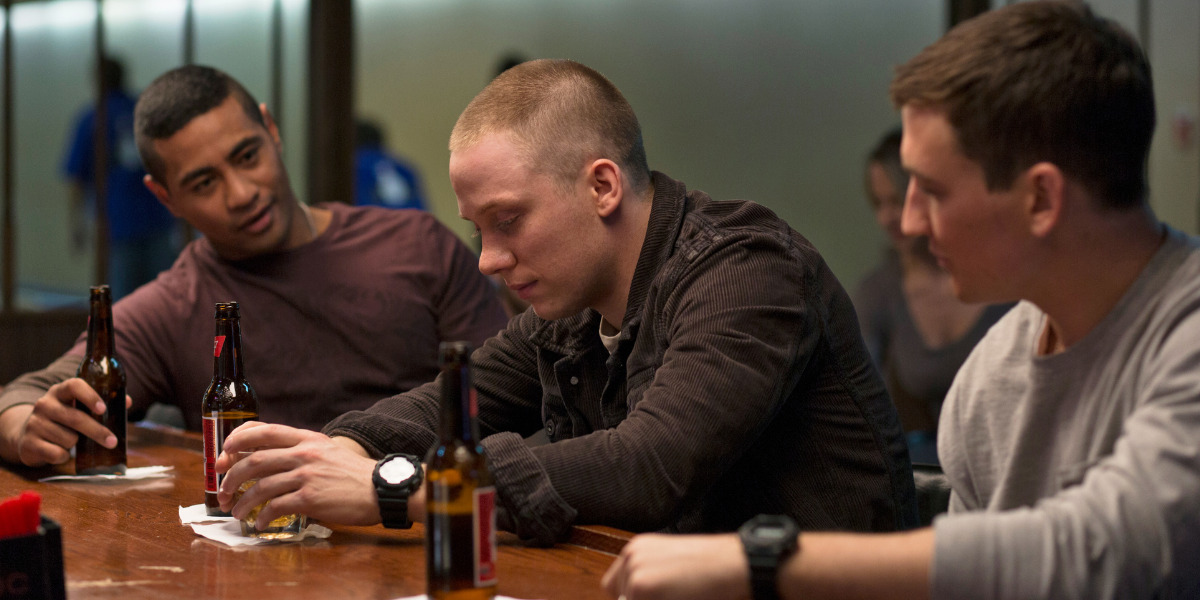Helmed by Jason Hall, ‘Thank You For Your Service’ is a war drama film that highlights the struggles veterans face post-war when reintegrating into civilian life. Following Staff Sergeant Adam Schumann and his close fellow veteran friends, Tausolo “Solo” Aieti and Billy Waller, the film chronicles their lives upon return from Iraq. However, as time progresses, memories of the war start to resurface violently, resulting in dreadful situations. As Adam and Solo’s life gets more complicated, they try and seek professional help to deal with their past trauma.
Featuring stirring performances by Miles Teller, Beulah Koale, and Joe Cole, alongside others, the 2017 film ventures into an authentic and raw exploration of PTSD and suicidal ideation. Since Billy Waller plays such a crucial role in the story both thematically and narratively, viewers must be curious about whether or not his character has any basis in reality.
Billy Waller is Not Based on a Real Person
‘Thank You For Your Service’ is a biographical film inspired by real-life events and people, recorded by award-winning journalist David Finkel in his 2013 eponymous non-fiction book. Nevertheless, even though Hall’s film is based on real life, it still takes creative liberty wherever necessary to accommodate the plot. Billy Waller’s character seems like one such accommodation.

The film earns much of its authenticity and realism through its connection to Finkel’s work. Finkel spent months researching for his book, interviewing veterans like Adam Schumann and his family, and learning about their lives intimately. The same resulted in a deeply personal and universally relatable account of veterans’ experiences with psychological struggles after the war. As such, since Billy Waller has scarcely any mention in the same, it’s safe to assume, he’s not based on an actual soldier.
Instead, Billy Waller is a character invented by Hall to add additional value to his story. In the film, shortly after Billy returns from his tour in Iraq, he finds his family life in shambles after his fiance leaves him and takes all their furniture alongside her daughter. Shortly afterward, Billy commits suicide, and we learn he has been struggling with his trauma for a while now and was thinking of seeking help from a professional facility. This discovery helps Adam recognize that he needs help with his own issues. The same nudges him toward the path of rehabilitation.
Although these events may be fictitious in relevance to the real Adam Schumann’s life, the incident, and consequently Billy’s character, still has some basis in reality. Through Billy’s character, the narrative underlines the importance of mental health among war veterans who often experience intense suicidal ideation after their return from war zones. Although, according to Veterans Affairs’ 2022 National Veteran Suicide Prevention Annual Report, the veteran suicide count has decreased over the years, the issue still persists in concerning numbers.
According to Stop Soldier Suicide, a veteran-led organization that prevents suicides among at-risk individuals, the suicide rate in the military is 57% higher than the national average. Therefore, through Billy’s story, the film strives to bring an incredibly relevant issue to light and start a conversation. In that sense, Billy’s experiences might be highly realistic and relatable for people who are going through a similar situation. With his film, Hall wanted to create an accurate account of veterans’ lives and showcase their stories as truthfully as possible. As such, through Billy’s character, Hall’s film reflects a harsh truth of reality and urges viewers to engage with the issue of mental health in real life.
Since the film focuses on the after-effects of war, Billy’s demise, even though grim, provides an authentic portrayal of what many individuals go through after their time in the army. Ultimately, although Billy Waller’s character arc and his storyline take heavy inspiration from real life, he is not based on a particular real-life person. Nevertheless, his experience is rooted in reality and serves as a reflection of many veterans’ experiences.
Read More: Thank You for Your Service Based on a True Story?


You must be logged in to post a comment.